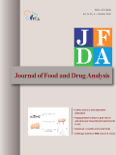
JOURNAL OF FOOD AND DRUG ANALYSIS
metrics 2024
Empowering Researchers with Open Access Discoveries
Introduction
JOURNAL OF FOOD AND DRUG ANALYSIS, an esteemed publication in the realms of Food Science and Pharmacology, is published by DIGITAL COMMONS BEPRESS. With an impactful commitment to open access since 2013, this journal facilitates the dissemination of critical research findings, making them readily available to a global audience. Boasting a commendable Q2 ranking in both Food Science and Pharmacology, the journal occupies a prominent position in its respective categories, reflecting its quality and relevance in the field. Established in 1994, the journal has successfully converged its focus to encompass a wide range of topics related to the analysis of food and drugs, thereby providing valuable insights to researchers, practitioners, and students alike. With its indexed indicators in Scopus showcasing a strong performance—ranking #85 among 389 in Food Science and #108 among 313 in Pharmacology—it stands as a crucial platform for the advancement of knowledge and innovation. For those looking to stay abreast of pivotal developments in food safety and drug efficacy, JOURNAL OF FOOD AND DRUG ANALYSIS is an indispensable resource.
Metrics 2024
 0.61
0.61 2.60
2.60 4.90
4.90 79
79Metrics History
Rank 2024
Scopus
IF (Web Of Science)
JCI (Web Of Science)
Quartile History
Similar Journals
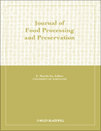
JOURNAL OF FOOD PROCESSING AND PRESERVATION
Elevating Standards in Food Processing and PreservationJOURNAL OF FOOD PROCESSING AND PRESERVATION, published by Wiley-Hindawi, stands as a vital resource within the fields of Food Science, Chemical Engineering, and Chemistry. With an ISSN of 0145-8892 and an E-ISSN of 1745-4549, the journal has been a beacon of knowledge since its inception in 1977, continuing to provide valuable insights to the research community until 2024. Recognized for its quality, it holds a noteworthy Q2 ranking in 2023 across multiple categories, including Food Science and Chemical Engineering, indicating its influential contribution to the academic discourse. Although it offers no open access, the journal remains a crucial platform for disseminating groundbreaking research and innovative methodologies in food processing and preservation. Researchers, professionals, and students can significantly benefit from its comprehensive reviews, original research articles, and case studies, aimed at advancing knowledge and practices in food technology. By bridging the gap between theoretical advancements and practical applications, the JOURNAL OF FOOD PROCESSING AND PRESERVATION plays an essential role in addressing global food safety, sustainability, and quality challenges.
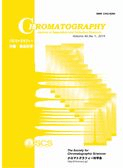
Chromatography
Pioneering techniques, bridging disciplines in chromatography.Chromatography is an esteemed journal published by the SOC CHROMATOGRAPHIC SCIENCES, dedicated to advancing the field of chromatographic techniques and their applications across various disciplines, including analytical chemistry, biochemistry, and environmental science. By facilitating the exchange of high-quality research, Chromatography plays a pivotal role in enhancing methodologies and technologies that drive innovation in sample analysis. While the journal is not currently open access, it maintains a rigorous peer-review process, ensuring the publication of valuable and impactful studies. Researchers, professionals, and students alike can benefit from its comprehensive coverage of chromatography-related advancements, making it a vital resource for anyone engaged in this dynamic area of study.

Applied Food Research
Fostering Sustainable Practices Through Research ExcellenceApplied Food Research, published by Elsevier, is an esteemed journal that plays a critical role in advancing the field of Food Science. With an ISSN of 2772-5022, the journal has established itself as a premier outlet for high-quality research, achieving a commendable Q1 ranking in the 2023 Food Science category and a 63rd percentile in Scopus rankings for Agricultural and Biological Sciences. Covering a diverse range of topics from food safety to innovative processing techniques, Applied Food Research seeks to publish pioneering studies that enhance our understanding of food systems and contribute to broader discussions on sustainability and nutrition. As it converges on its fourth year of publication, researchers, professionals, and students alike are encouraged to engage with its content through various open access options, ensuring widespread dissemination of knowledge in a field that is vital to global health and well-being. Operating out of Amsterdam, Netherlands, this journal is poised to be an indispensable resource for anyone dedicated to making significant contributions in the domain of food science.
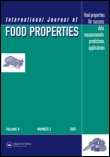
INTERNATIONAL JOURNAL OF FOOD PROPERTIES
Uncovering the science behind what we eat.INTERNATIONAL JOURNAL OF FOOD PROPERTIES, published by TAYLOR & FRANCIS INC, is a leading platform for disseminating high-quality research in the field of food science. With an ISSN of 1094-2912 and E-ISSN of 1532-2386, this journal has been committed to open access since 2018, ensuring that groundbreaking studies are readily available to global audiences. The journal has steadily gained recognition for its contribution to the discipline, achieving a Q2 ranking in Food Science and placing in the 68th percentile among its peers according to Scopus metrics. Covering a wide array of topics related to the properties and applications of food, it serves as a valuable resource for researchers, professionals, and students alike. With coverage extending from 1998 to 2024, the journal continually seeks to advance knowledge and foster innovation within the food science community, making it a pivotal publication for anyone serious about this vital field.

Food Analytical Methods
Elevating food science through innovative analytical insights.Food Analytical Methods, published by Springer, is an esteemed journal dedicated to the innovative field of analytical methodologies within the food sciences. With an ISSN of 1936-9751 and E-ISSN of 1936-976X, this journal serves as a pivotal platform for researchers and professionals to exchange insights, methodologies, and findings related to food quality analysis, safety measures, and innovative technologies in food science. As of 2023, Food Analytical Methods boasts impressive Scopus rankings, including Q2 in Analytical Chemistry and Food Science, positioning it among the top journals in its category. The journal's commitment to enhancing food safety and quality through rigorous research underscores its importance in both academic and industrial applications. Although it does not currently operate under an open-access model, it provides exceptional value through its rigorous peer-review process and comprehensive publication standards, further inviting contributions from both established and emerging scientists in the field. With coverage spanning from 2008 to 2024, this journal continues to address critical research areas, thereby shaping the future of food analytics.

Food Production Processing and Nutrition
Exploring nutritional insights through cutting-edge research.Food Production Processing and Nutrition, published by SpringerNature, stands at the forefront of advancing knowledge in the vibrant fields of food science, nutrition, and public health. This esteemed Open Access journal, operational since 2019, plays a pivotal role in disseminating breakthrough research that intersects food production processes with nutritional insights, making it an invaluable resource for researchers, professionals, and students alike. With a commendable 2023 impact factor reflecting its robust scholarly contributions — Q1 in Food Science and Q2 in both Nutrition and Dietetics and Public Health, Environmental and Occupational Health — the journal not only emphasizes the importance of innovative food processing methods but also addresses pressing nutritional challenges faced globally. Located in the United Kingdom, it claims an impressive Scopus ranking, with a notable percentile standing across various categorical metrics. As such, Food Production Processing and Nutrition is essential for anyone aiming to deepen their understanding of how food systems impact public health through effective processing and nutritional strategies.
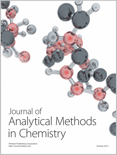
Journal of Analytical Methods in Chemistry
Fostering collaboration in the vibrant world of analytical science.The Journal of Analytical Methods in Chemistry, published by HINDAWI LTD, stands as a premier platform dedicated to the dissemination of research in the vibrant field of analytical chemistry. With an ISSN of 2090-8865 and an E-ISSN of 2090-8873, this Open Access journal has been committed to providing unrestricted access to quality research since 1978, thereby fostering greater collaboration and innovation among researchers, professionals, and students globally. The journal showcases rigorous research insights spanning diverse categories, earning impressive Scopus rankings including Q2 in Chemical Engineering and Q3 in Analytical Chemistry for 2023, positioning itself effectively among respected peers. Its interdisciplinary approach also covers significant contributions in the realms of instrumentation and computer science applications, thus addressing contemporary challenges and advancements in analytical methodologies. By bridging theoretical underpinnings with practical applications, the Journal of Analytical Methods in Chemistry aims to catalyze knowledge exchange while enhancing the global discourse in analytical science.
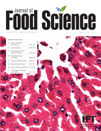
JOURNAL OF FOOD SCIENCE
Pioneering Insights in Culinary Science and TechnologyJOURNAL OF FOOD SCIENCE, published by Wiley, is a premier journal dedicated to advancing the field of food science, bridging the gap between fundamental research and practical application. With an impressive impact factor reflecting its authoritative status, the journal is ranked in the Q1 quartile for Food Science in 2023 and boasts a Scopus ranking of #71 out of 389, placing it in the 81st percentile within Agricultural and Biological Sciences. First launched in 1936, the journal continues to serve as an essential platform for researchers, professionals, and students to disseminate innovative studies and reviews that address critical issues in food quality, safety, and technology. While not currently offering open access, its rigorous peer-review process ensures the dissemination of high-quality and impactful research. Researchers engaged in the vital disciplines of food science will find this journal indispensable for keeping abreast of cutting-edge developments in the field.

ACS Food Science & Technology
Exploring the Chemistry of Culinary InnovationACS Food Science & Technology is a premier peer-reviewed journal published by the American Chemical Society (ACS) that addresses the dynamic intersections of food science, chemistry, and technology. With its E-ISSN: 2692-1944, this journal aims to disseminate innovative research and comprehensive reviews that enhance understanding in fields such as analytical chemistry, organic chemistry, and general food science. Despite the absence of an Open Access model, its position in the Q2 quartile for multiple categories in 2023 underscores its significant impact on the scholarly landscape, ensuring researchers can access high-quality research pertinent to today's food challenges. With an expanding timeline of 2021 to 2024, ACS Food Science & Technology is poised to be an essential resource for advancing the scientific community's knowledge, fostering collaboration, and bridging gaps between academia and industry.
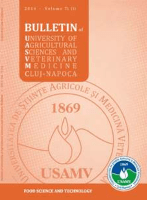
Bulletin of University of Agricultural Sciences and Veterinary Medicine Cluj-Napoca-Food Science and Technology
Cultivating Knowledge for Global Food SystemsBulletin of University of Agricultural Sciences and Veterinary Medicine Cluj-Napoca - Food Science and Technology is a prominent peer-reviewed journal dedicated to advancing the field of food science and technology. Published by the University of Agricultural Sciences and Veterinary Medicine Cluj-Napoca, this open-access journal has been serving the academic community since 2013, promoting the dissemination of high-quality research that addresses pressing issues in food safety, quality, and innovation. With its ISSN 2344-2344 and E-ISSN 2344-5300, the journal aims to bridge the gap between academia and industry by providing a platform for scholars and practitioners to share their findings, insights, and methodologies. Situated in the heart of Romania, the journal reflects the country's rich agricultural heritage and its commitment to enhancing global food systems. By maintaining a rigorous editorial standard, the Bulletin ensures that it remains a vital resource for researchers, industry professionals, and students who are keen to explore the latest developments in food science.